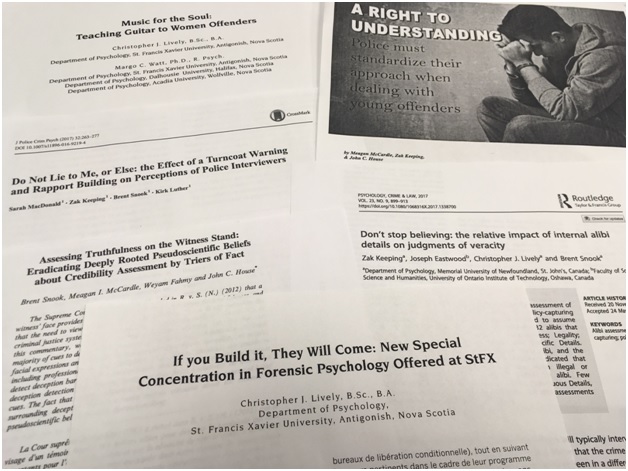Hey everyone. The Fall 2017 semester is finished! Whether this past semester was your first experience of graduate school, or it was your final term and you’re now moving on, I sincerely hope that the past three months was an enjoyable time for you. Despite this being my seventh semester at Memorial, I’m still always surprised at how quickly the term goes by. Of course, the swiftness of the semester generally is an indicator that it has been busy, and I’m certain that we are all looking forward to the holiday break for a well-earned rest.
As for me, this last semester has been eventful and contained much more responsibility than I had during my master’s degree. For example, in addition to the opportunities given to me by my department and supervisor for this year (e.g., guest lecturer for an undergraduate course and coordinator for a graduate level colloquium series class), I have also taken on the responsibility of Associate Editor for a student research journal. Beyond these tasks, my day-to-day graduate life is largely the same, but as I’m sure you will all agree, there is never a shortage of tasks to be completed as a graduate student. The fact that my PhD program is thesis-driven (vs. my previous course-based MSc program) has allowed me to focus more closely on some current research endeavours. As a result, I have had the pleasure of collaborating on projects with colleagues within my own lab, and working with other researchers from outside of my lab – both on forensic and non-forensic related research questions. Being involved in these efforts has subsequently resulted in presentations being created for conferences and manuscripts written for publication (all great skill sets to develop as a budding academic). In particular, when there are multiple collaborators involved on a project, the issue of authorship order should be addressed before getting too deep into the work. Consequently, I thought this notion would be an applicable topic to write about for the graduate student blog.
Unless you’ve had the opportunity to work collaboratively on projects and publish during your undergraduate experience (if so, well done!), the process and etiquette of authorship may be unfamiliar to some graduate students. The issue of authorship can get tricky, especially when patents or trademarks of a product become involved; however, for the purposes of this blog, I will generally only focus on author credit considerations in terms of standard empirical papers and speak from my own experience.
In my own academic career, I have had an overall positive experience in terms of working collaboratively with other research colleagues. Although my list of publications to date is small, each experience with my collaborators has been rewarding and I learned some valuable lessons as a writer and critical thinker. Generally, I think that my own experience has been positive given that the issue of authorship has always been dealt with directly before proceeding too far into the endeavour. Typically, the pattern of authorship should reflect the amount of work and contribution effort that has been given by each individual involved in the project. Having an open and honest discussion early in the process about levels of responsibility and credit is a great way to make authorship decisions and ensure that all parties involved are satisfied. With all this said, roles and responsibilities can change over the duration of the research timeline. For example, perhaps a person originally had a smaller performance role on the project (e.g., data collection), but later contributed substantial and meaningful intellectual content during the writing phase of the project. In this sort of scenario, it may warrant a change in position on the authorship list. Again, this goes back to being transparent with your collaborators, having open discussions about the contributions, and recognizing the true efforts of your colleagues.
Of course, different research groups, labs, and supervisors may take a different approach than what I have suggested above. Moreover, funding agencies supporting the research project may have some criteria that must be addressed in terms of authorship, as well. Given the nature of some research endeavours, collaborations are sometimes unavoidable and decisions on where to give credit can be controversial. Nevertheless, this is the take home message: as graduate students, have an open and honest discussion with your supervisors and collaborators about authorship concerns. Beyond this, you can also look to guidelines that your discipline may have as a way to help inform these decisions. For example, groups such as the International Committee of Medical Journal Editors, and the American Psychological Association provide recommendations for determining authorship. There are also other sources available online that offer insights into this (sometimes) complex issue.
I’ll add one final point. Regardless of all the politics related to authorship, I encourage you to continue pursing rigorous research and test your new ideas empirically. The beauty of being part of a cutting edge research community is that we can provide new innovative solutions to identified problems, and answer important questions relevant to our areas of specialty. I hope this information is helpful for graduate students navigating the research and publication process. If you’re ever in doubt about any step along the way, be sure to ask! Don’t just continue in silence, but instead reach out to other people you trust who have knowledge about the issue. It’s always important to give credit where credit is due, and authorship is a reflection of this.
Enjoy your last day few weeks of studies. I wish you all the very best of luck on your exams and remaining assignments that you’re finishing up. Have a great holiday break!
Until next time…
~Chris
